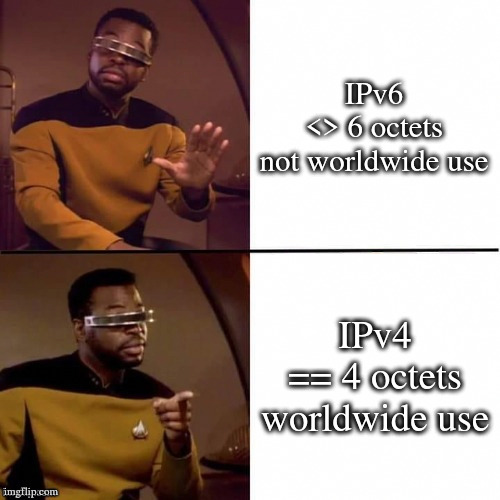this post was submitted on 19 Jun 2024
315 points (85.6% liked)
Programmer Humor
22410 readers
2708 users here now
Welcome to Programmer Humor!
This is a place where you can post jokes, memes, humor, etc. related to programming!
For sharing awful code theres also Programming Horror.
Rules
- Keep content in english
- No advertisements
- Posts must be related to programming or programmer topics
founded 2 years ago
MODERATORS
you are viewing a single comment's thread
view the rest of the comments
view the rest of the comments

We are talking about addresses, not counters. An inherently hierarchical one at that (i.e. it goes from top to bottom using up all bits). If you don't use the bits you are actually wasting them.
So why didn't we make other bits available for IPv4 gradually? Yeah, same issue as that: Forwards compatibility. If you meant that this "IPv5" standard should specify compulsory 64-bit support from the very beginning, then why are you arbitrarily restricting the use of some bits in the first place?
All the 128 bits are used in IPv6. ;)
Bullshit.
I have a 64-bit computer, it can address up to 18.4 exabytes, but my computer only has 32GB, so I will never use the vast majority that address space. Am I "wasting" it?
Yes they are all "used" but you don't need them. We are not using 2^128 ip addresses in the world. In your own terminology: you are using 4 registers for a 2 register problem. That is much more wasteful in terms of hardware than using 40 bits to represent an ip address and wasting 24 bits.
You are using the addressing bits in the form of virtual memory. Right now. Unless you run a unikernel system, then in that case you could be right, but I doubt it.
Anyway, this is apples and oranges. IP addresses are hierarchical by design (so you have subnets of subnets of subnets of ...), memory addresses are flat for the most part, minus some x86 shenanigans.
But we do need them! The last 64 bits of your IPv6 addresses are randomized for privacy purposes, it's either that or your MAC address is used for them. We may not be using those addresses simultaneously but they certainly are used.
Despite that, there still are plenty of empty spaces in IPv6, that's true. But they will still be used in the future should the opportunity arise. Any "wastage" is artificial, not a built-in deficiency of the protocol. Whereas if we restricted the space to 40 bits, there will be 24 bits wasted forever no matter how.